Recent Fire Damage Posts
Sounding the Alarm: The Critical Role of Smoke Detectors in Home Safety
4/8/2024 (Permalink)
Home is a sanctuary, a place of comfort and security. Yet, unforeseen dangers like fire can threaten this haven. Smoke detectors stand as vigilant guardians, providing an early warning system that is fundamental to the safety of every household. In this blog, we explore the indispensable role of smoke detectors in safeguarding lives and property.
Early Detection Saves Lives
The primary function of a smoke detector is to detect the presence of smoke, signaling the possibility of a fire in its early stages. This early detection is crucial, as it allows residents to respond swiftly, potentially escaping harm or taking necessary actions to contain the fire.
Smoke detectors are designed to emit a loud, piercing alarm when smoke is detected. This immediate alert not only notifies those inside the home but also acts as a call to action for emergency responders, ensuring a quicker response time in the event of a fire.
Protection During Sleep
Fires can occur at any time, including when occupants are asleep. Smoke detectors provide a critical layer of protection during these vulnerable hours, waking residents and giving them the precious seconds needed to evacuate safely.
Modern smoke detectors are equipped with advanced technology that can detect various types of smoke, including slow smoldering fires and fast-flaming fires. This versatility enhances their effectiveness in providing comprehensive coverage.
Installation Flexibility
Smoke detectors are adaptable to various living spaces. They can be installed in bedrooms, hallways, kitchens, and common areas, ensuring comprehensive coverage throughout the home. Installing detectors in interconnected systems further enhances their effectiveness.
Smoke detectors play a central role in home fire escape plans. Their early warning signals allow occupants to enact predetermined escape routes, making the evacuation process more organized and reducing the risk of panic during emergencies.
Building Codes
Many building codes mandate the installation of smoke detectors in residential structures. Compliance with these regulations not only ensures the safety of occupants but also contributes to the overall fire safety of communities.
Modern smoke detectors are designed for convenience and low maintenance. Regular testing and occasional battery replacements are simple tasks that significantly contribute to their reliability.
Affordable and Accessible
Smoke detectors are widely available at affordable prices, making them a cost-effective investment in home safety. Their accessibility ensures that households of all income levels can benefit from this essential safety device.
In addition to detecting flames, smoke detectors are critical for identifying silent but deadly threats like carbon monoxide. Many modern detectors are equipped to sense elevated levels of carbon monoxide, providing comprehensive protection for residents.
Peace of Mind for Families
Knowing that smoke detectors are actively monitoring for potential fire hazards provides peace of mind for families. This sense of security allows residents to focus on enjoying their homes without the constant worry of undetected fire risks.
The integration of smoke detectors with smart home systems enhances their functionality. Smart detectors can send alerts to smartphones, enabling remote monitoring and notifications even when residents are away from home.
Smoke detectors are not mere accessories; they are life saving investments that form the backbone of home safety. From providing early warnings to facilitating rapid responses during emergencies, these devices are integral to the protection of lives and property. Every home should prioritize the installation, maintenance, and regular testing of smoke detectors to ensure a secure living environment for all.
Fire Safety Plan for Families: A Comprehensive Guide to Protecting Your Loved Ones and Home
11/15/2023 (Permalink)
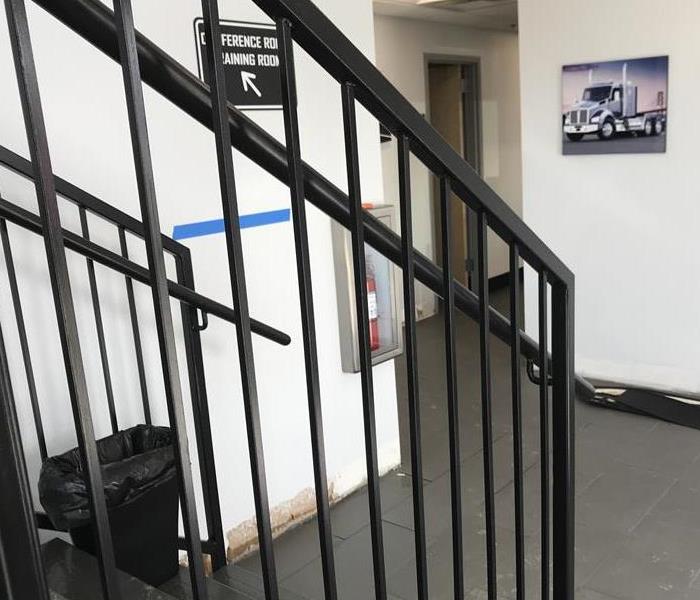 Creating a fire safety plan is important to ensure your safe incase of a fire.
Creating a fire safety plan is important to ensure your safe incase of a fire.
Creating a fire safety plan is one of the most important steps you can take to protect your family and home. In this blog, we will guide you through how to create a fire safety plan for your family, providing practical tips for prevention, detection, and evacuation.
Step 1: Prevention
Prevention is key to fire safety. Conduct a home inspection to identify potential hazards, such as outdated wiring, overloaded outlets, or flammable materials. Ensure that smoke detectors are installed in every room and tested regularly. Develop safe cooking habits, such as never leaving stovetops unattended and keeping flammable materials away from heat sources.
Step 2: Detection
Early detection of a fire can save valuable time and lives. Install smoke detectors and carbon monoxide detectors, testing them regularly to ensure that they are in working order. Consider investing in a monitored fire alarm system, which alerts authorities automatically, even if you are not home.
Step 3: Evacuation
Knowing what to do in the event of a fire is essential. Develop a clear evacuation plan, outlining routes and designated meeting points outside the home. Practice drills with your family at least twice a year, ensuring that everyone knows how to exit the building safely. Teach children how to dial 911 in case of an emergency, and discuss alternate exits in case of blocked pathways.
Step 4: Additional Considerations
In addition to prevention, detection, and evacuation, there are additional considerations that can enhance your fire safety plan. Ensure that all family members know how to operate a fire extinguisher and that one is within reach. Keep important documents and emergency contact information in a fireproof safe or off-site location. Develop a plan for pets, ensuring that they are included in the evacuation route.
Step 5: Regular Review and Updates
A fire safety plan should not be a one-time exercise. It is important to regularly review and update your plan to account for any changes in your home, such as renovations or new occupants. Test your smoke detectors and carbon monoxide detectors periodically and replace batteries as needed. Conduct practice drills to reinforce the evacuation plan with all family members, including children and elderly individuals. Stay informed about new fire safety technologies or best practices that can enhance the effectiveness of your plan. By staying proactive and making necessary adjustments, you can ensure that your fire safety plan remains robust and ready for any emergency.
Creating a fire safety plan for your family requires attention to detail and preparation. By focusing on prevention, detection, and evacuation, and factoring in additional considerations, you can protect your loved ones and home from the devastating effects of a fire. Start planning today to ensure a safe and secure tomorrow.
Grill Cleaning 101: A Step-by-Step Guide to Getting Your Grill Ready for the Season
8/23/2023 (Permalink)
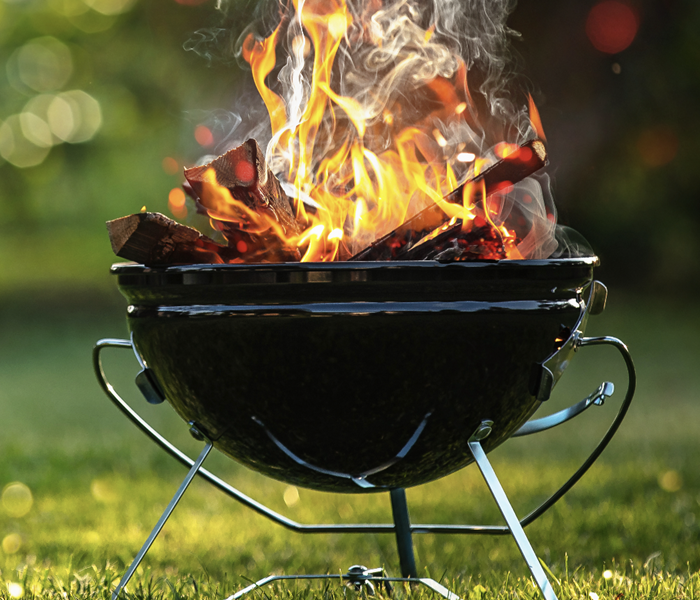 Protect your home! Clean your grill to prevent grill fires.
Protect your home! Clean your grill to prevent grill fires.
Grilling season is here, and no doubt you are looking forward to some mouth-watering barbecues with family and friends. However, before you get the grill going, it’s important to give it a good clean to ensure it’s safe and free of any leftover food or debris from last season. In this post, we’ll give you a step-by-step guide on how to clean your grill and get it ready for the season.
Turn Off the Gas Supply
Make sure your grill is turned off and the gas supply is disconnected before you start cleaning.
Clean the grates using a wire or nylon brush, scrape the grates to remove any stuck-on food or debris. This will help to prevent any unwanted (and potentially toxic) flavors from contaminating your food. Once you have scraped the grates, soak them in soapy, warm water for 30 minutes. This will help to remove any remaining gunk or residue.
After soaking, scrub the grates with a soft-bristled brush to remove any remaining grease or debris. Rinse the grates thoroughly with water and dry with a clean cloth.
Wipe Down the Exterior
Using a damp cloth and mild soap, clean the exterior of the grill, paying special attention to any areas that have been exposed to grease or food. Remove the cooking grates and clean the interior of the grill with a mild, non-toxic cleaning solution. Wipe down any surfaces, paying particular attention to the burner tubes and heat deflectors.
Once you have finished cleaning, reassemble the grates and turn on the grill to let it heat up for 10-15 minutes. This will help to burn off any remaining residue and sanitize the grates.
Don't forget to clean the drip pan underneath the grill. This is where grease and drippings accumulate. Remove the pan and empty any leftover liquid or debris. Scrub it with warm soapy water and rinse thoroughly. If your grill has disposable drip pans, replace them as needed.
Clean the Burner Tubes
Over time, burner tubes can become clogged with grease and debris, affecting the performance of your grill. Use a wire brush or a small bottle brush to clean the burner tubes. Check for any blockages and remove them carefully. This will ensure that the burners provide an even flame and consistent heat distribution.
If your grill has an electric igniter, clean it gently with a soft cloth. Make sure it is free from grease or dirt, as this can prevent it from working properly. If you have a gas ignition system, check for any loose connections and make sure the spark is igniting the gas. It's essential to clean and maintain your grill brush as well. After each use, give it a good rinse with water to remove any grease or food particles. Let it dry completely to prevent the growth of bacteria. If your brush has worn bristles or is not in good condition, consider replacing it for better cleaning performance.
Store Your Grill Properly
Once you have finished cleaning, make sure your grill is completely dry before covering it or storing it for an extended period. Moisture can lead to rust and other damage. Use a grill cover or store it in a dry, covered area to protect it from the elements.
Cleaning your grill regularly not only ensures food safety but also helps prolong the life of your grill. Make it a habit to clean your grill after each use and perform a thorough cleaning at the beginning and end of the grilling season. This will keep your grill in good condition and ready for use whenever you crave some delicious barbecue.
Remember, a clean grill is not only important for food safety but also for optimal grilling performance. By following these tips and maintaining a proper cleaning routine, you can enjoy flavorful and safe meals all season long. Happy grilling!
Is Your Rental Property Protected? Understanding Renter's Insurance Coverage for Fire Damage
5/1/2023 (Permalink)
 Reviewing your policy and understanding coverage can help you understand what is covered incase of an emergency.
Reviewing your policy and understanding coverage can help you understand what is covered incase of an emergency.
If you're renting an apartment or a house, it's important to consider getting renter's insurance. Renter's insurance helps protect your belongings in case of damage or loss due to various circumstances such as theft, water damage, and fire. But does renter's insurance also cover fire damage? In this article, we'll discuss the details of renter's insurance and its coverage of fire damage.
Understanding what insurance covers
To start, it's important to understand what renter's insurance covers. Renter's insurance typically covers your personal belongings such as furniture, electronics, and clothing. It also provides liability coverage in case someone is injured while on your rental property. Additionally, some renter's insurance policies may cover additional expenses such as temporary housing if your rental property becomes uninhabitable due to a covered incident.
Coverage
When it comes to fire damage, renter's insurance generally covers the cost of repairing or replacing your damaged belongings. This coverage can also extend to damage caused by smoke and water used to extinguish the fire. However, it's important to note that not all renter's insurance policies are the same, and coverage may vary depending on the specific policy you have purchased.
Understanding the Circumstances
In addition, it's important to understand the circumstances that may affect your renter's insurance coverage for fire damage. For instance, if the fire is caused by your negligence, such as leaving the stove on or using faulty electrical appliances, your insurance company may not cover the damages. Similarly, if you fail to report the fire in a timely manner or fail to take reasonable precautions to prevent further damage, your insurance company may deny your claim.
It's also important to note that if you live in an area prone to wildfires, your renter's insurance policy may not cover damages caused by wildfires. In such cases, you may need to purchase additional coverage or a separate policy that specifically covers wildfire damage.
In conclusion, renter's insurance can provide valuable coverage for fire damage to your personal belongings. However, it's important to understand the details of your policy and the circumstances that may affect your coverage. By taking the time to review your policy and understanding your coverage, you can make informed decisions and ensure that you're adequately protected in case of a fire or other unexpected event.
Evacuation and Fire Escape Plan
2/5/2023 (Permalink)
 Having a fire escape plan in place to help prevent injury incase of fire emergency
Having a fire escape plan in place to help prevent injury incase of fire emergency
If you have kids or pets, your evacuation plan needs to be tailored a little differently than that of a household without little ones. In this guide, we'll walk you through some basic steps and considerations when preparing for an emergency situation. Check out our tips below!
Evacuation Plan
When you have kids in your home it is safe to have an evacuation plan in place incase of an emergency. Have a fire escape ladder, a smoke alarm and a fire extinguisher installed in the area of the home where the kids sleep and train them how to use in the case of an emergency. Consider having a first aid kit and firer blanket in case of an emergency as well.
Fire Escape Plan
The location of your nearest fire escape is important to know. A fire escape is any exit that leads out of the inside of a building, and can be used to exit in case of an emergency. There are several types of fire escapes, an exterior balcony, an interior stairway or hallway, and even a ladder that can be used on the side of a building.
If you don't have access to a balcony or stairwell, you may have access to a ladder on the side of your apartment building. This kind of escape route could be helpful if there's not enough time for you or your family members to run down several flights of stairs before the fire reaches them. Some apartments will have bars over their windows, which would prevent anyone from climbing out this way without breaking through glass first.
Be sure to know where all smoke detectors are placed within each room so they're easy reachable during times when everyone needs them most. Practice a fire escape plan and have a plan B in place with your family in case of a fire emergency.
We hope that this guide has helped you to think about how you can prepare for a fire. It's important to put together an fire escape plan, and have a plan B in case your home doesn't have sprinklers or other safety features. Knowing the best way out of your home can save lives!
How To Recognize a Gas Leak
12/14/2022 (Permalink)
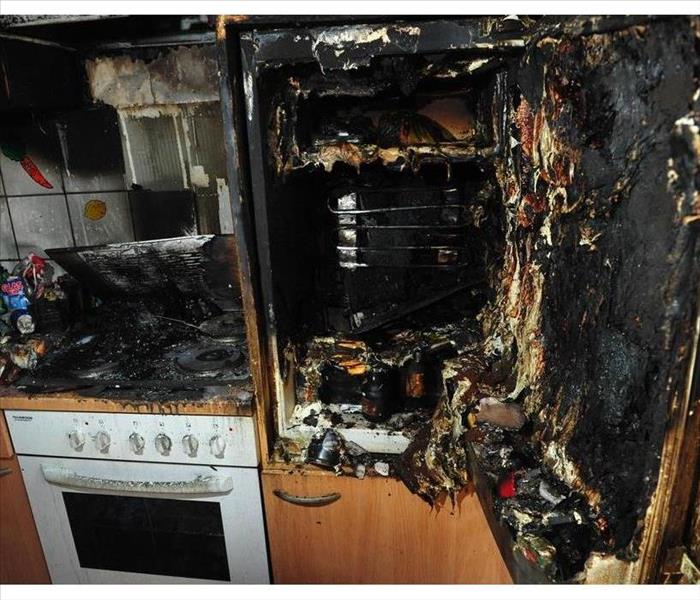 Fire damage to a kitchen due to gas leak.
Fire damage to a kitchen due to gas leak.
Everything You Need to Know About Gas Leaks
Natural gas is a very useful source of energy, but there are times when it can be harmful. This is especially true if your home has a gas leak. Natural gas leaks are extremely flammable and can cause serious injury if they aren't addressed immediately. If you suspect that your home has a natural gas leak, here's what you need to know about how to recognize one and what steps to take next.
Recognizing a Gas Leak
If you suspect a gas leak, there are signs to look out for. These include:
- A strong odor (like rotten eggs)
- Bubbling sounds
- Flames or sparks
The safest thing to do in this situation is to follow the steps listed below, ensuring you evacuate the property as quickly as possible.
Steps to Take After a Gas Leak
If you smell natural gas, or if you suspect a gas leak:
1. Turn off the main valve to your propane tank.
2. Call your propane supplier immediately (or call 911 if it's an emergency). If possible, have the phone number and address of where you are located ready to share with them when they answer the phone.
3. Leave the area immediately and close all doors behind you after exiting so that no one else disturbs or triggers any potential leaks as they try to enter or exit through that door. Do not re-enter until after a professional has arrived at your home/business and found no problems with your pipes/piping system.
If there is an open flame nearby - such as from a pilot light on a water heater or stovetop burner - attempt to extinguish those flames before leaving; once extinguished, leave immediately without taking anything with you (i.e., don't turn off lights).
Preventing a Gas Leak
Check for leaks. If you've recently used a new appliance, such as a dryer or stove, check for leakage from the connection points of the appliance in question—typically located at the back of it. You can also check by turning off all gas appliances in your home and then re-lighting each one separately to test whether there is any leakage when they are turned on again.
Keep adequate ventilation around gas appliances: Make sure there are no obstructed vents or exhausts on your range hood or laundry vent (also known as an "exhaust fan").
Don't use pilot lights to heat your home: If you have an older gas furnace that runs off of a pilot light instead of electricity, don't keep it running continuously; turn it off when you leave the house and turn it back on when you return. This will help prevent carbon monoxide poisoning and make sure everything is working properly without wasting energy unnecessarily!
A natural gas leak can be a serious hazard, dangerous and deadly. Gas leaks can cause explosions, fires and carbon monoxide poisoning. Natural gas also has the potential to cause property damage due to its flammability.
So, now that you know how to recognize a gas leak and what to do if there is one, it's time to make sure your home is safe. You don't want any of your family members or pets getting hurt because of a gas leak! If you think something might be wrong with the natural gas lines in your home, call an expert immediately.
If your home catches on fire due to a natural gas leak, give SERVPRO of St. Louis County a call.
3 Ways Professionals Eradicate Smoke Damage
10/1/2022 (Permalink)
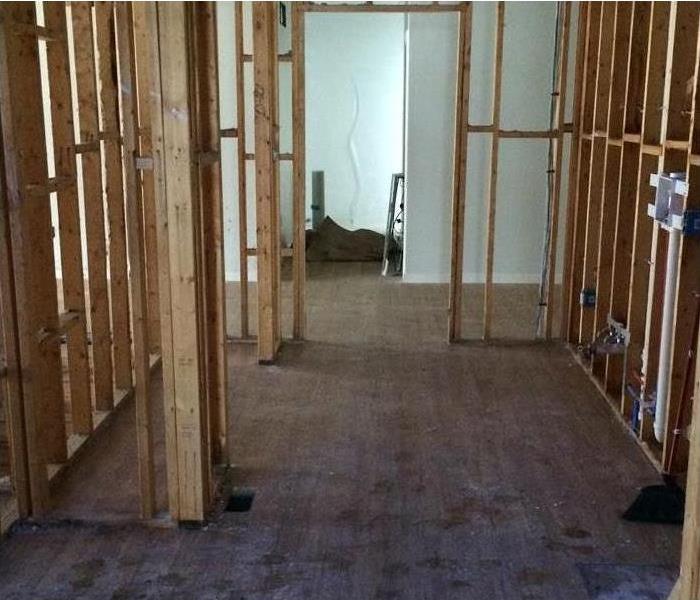 Clean up after a fire in Manchester, MO.
Clean up after a fire in Manchester, MO.
Fire Restoration
When you think of fire damage, you probably see flames consuming a property, tearing the structure down. However, there is also another large issue in these types of disasters: smoke damage. For this reason, smoke cleaning practices can be imperative in dealing with any fire-damaged property in Manchester, MO. Here are three ways professional restoration experts may tackle this issue.
1. They determine the most effective cleaning method. Different materials call for varied ways of cleaning. For light damage, dry cleaning is often best. For heavier damage, wet cleaning may be required. Although wet cleaning is typically the stronger method of cleaning, it can’t be used for all materials. For everything else, spray-and-wipe cleaning and foam cleaning help. Additionally, there is abrasive smoke cleaning, which involves strongly scrubbing, and immersion cleaning, which involves soaking items in solution.
2. They move damaged items. Moving contents to a smoke-free location can help eliminate odor, giving it a chance to air out in a fresh environment. It can also protect the items from further damage that could occur if they are left in a fire-destroyed building. Finally, it clears space so building restoration can happen quicker.
3. They improve air quality. Generally, the main issue with smoke odor damage is the low quality of air after a fire. The smoke lingers, creating an unpleasant smell. One way to combat this is to change the HVAC filter, but professionals often use an air filtration device, ozone machine, or thermal fogger to improve the air. One thing you shouldn’t do is turn on any ceiling fans because their wiring could be ruined.
The above practices of smoke cleaning can help move the restoration process along, eliminating stress. Damage from fire doesn’t have to be debilitating if the correct steps are taken to restore a building’s contents. By relying on professionals to correctly clean and move objects and improve the air quality, you can be on your way toward recovery.
How To Properly Clean Your Microwave
7/28/2022 (Permalink)
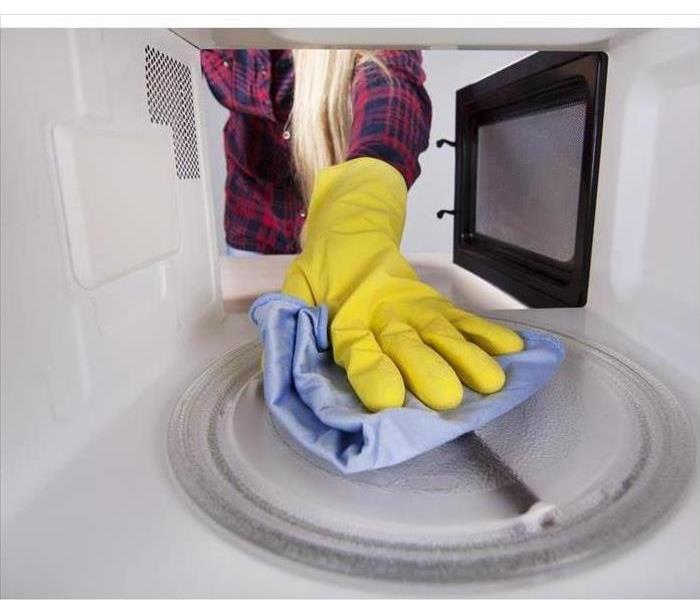 Keeping your microwave oven clean is an essential aspect of basic kitchen maintenance.
Keeping your microwave oven clean is an essential aspect of basic kitchen maintenance.
How To Properly Clean Your Microwave
Keeping your microwave oven clean is an essential aspect of basic kitchen maintenance. By cleaning your unit often, you can significantly reduce the risk of a fire. It’s crucial to be proactive in cleaning your kitchen appliances so that you can be well prepared to tackle any problems that may arise, whether it’s a smoke smell or a broken unit. Here are some simple but effective tips for cleaning your appliance properly and keeping your home in Country Life Acres, MO, safe from danger.
Clean the Grease Filter
You should always make sure that you’re cleaning the grease filter in your appliance at least once a month. To properly clean the grease filter, follow these steps:
- Soak it in detergent and hot water
- Remove debris from the filter by scrubbing it lightly
- Steer clear of cleaning products that contain ammonia
While these guidelines are a helpful starting point, it’s a good idea to consult the owner manual that came with your microwave to ensure that you clean your grease filter appropriately.
Wipe Down the Unit After Each Use
The best way to be consistent when cleaning your appliance is to wipe it down well after each use. This helps the unit function more effectively and prevents a smoke smell from occurring. Although this may seem like a tedious step, it’s necessary in order to properly maintain your unit and keep your home safe.
Clean the Vents
Finally, be sure to pay attention to the vent grill in your unit. This feature can accumulate large amounts of dirt and grease if isn’t cleaned on a regular basis. By taking a minute to wipe down your unit’s vents, you can help it stay clean and reduce the risk of a fire breaking out.
While it’s important to do what you can to maintain your microwave oven, accidents may still happen. If you notice a smoke smell coming from your unit, it can lead to fire damage and other complications. Don’t hesitate to call emergency restoration services no matter what state your home is in.
What To Do If You Face Coinciding Water and Fire Damage
6/15/2022 (Permalink)
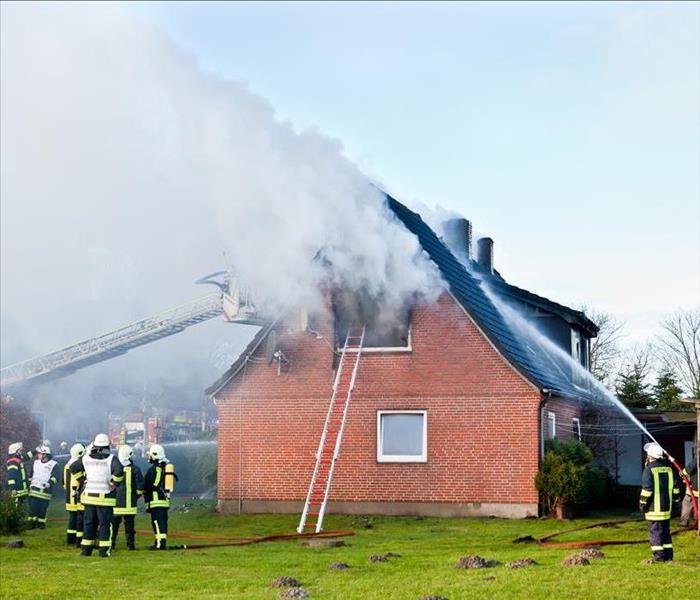 A home fire can be devastating.
A home fire can be devastating.
Residential Fire and Water Damage
A home fire can be devastating with a lengthy restoration process to follow. However, it's often overlooked how homes that endure fire damage typically incur water-related damages as well. Here is what to do if this situation impacts your Bella Villa, MO, home.
1. Call Home Restoration Professionals
After a fire, an emergency cleanup and restoration company can fully evaluate the property and take the necessary steps to repair any damages. These professionals have the proper equipment to safely restore your home from fire and smoke damage and are trained to clean up water issues if they are present.
2. Address Water Damage
A fire has to be put out one way or another, so homes often end up being water-logged after the flames are put out. A fire hose can expel about six gallons of water per minute, therefore your home can suffer damage from excess water by the time the fire is extinguished. It is paramount to remove standing water and dry out the space as quickly as possible to prevent mold growth or other harmful effects. This can compromise the building structure and should be taken care of immediately before moving on to other repair efforts.
3. Address Fire Damage
Once any water in the home has been taken care of, restoration experts can then move on to address smoke and fire-related damage. This typically consists of smoke and soot removal, sanitizing surfaces and removing smoke odors, as well as necessary home repairs. Depending on the extent of damage, minor repairs like painting or recarpeting could cap the process or major home construction could be possible.
Given the massive amounts of water used to put out a fire, homes can simultaneously face damage from both elements. If this happens, bring in restoration professionals who will work to address the water issues first before moving on to repair fire damage.



 24/7 Emergency Service
24/7 Emergency Service






